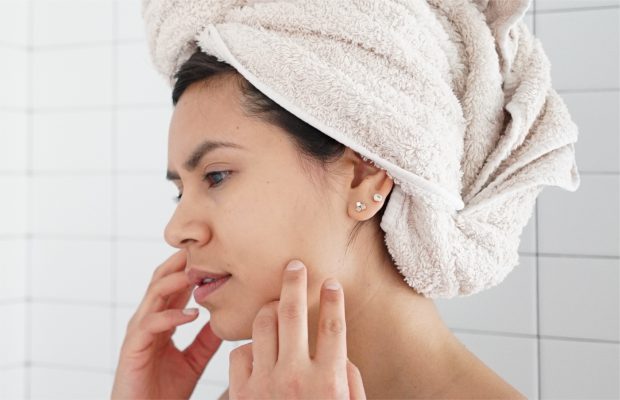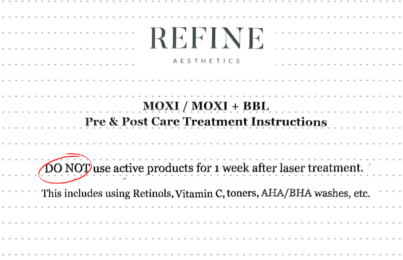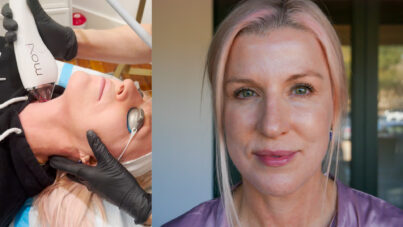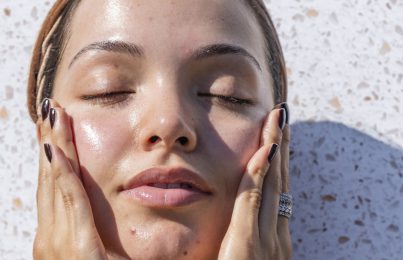Most people getting a facial are looking for one of two things. One, you’re looking to relax, feel pampered, and emerge dewy and glowing like a freshwater pearl. Two, you have specific skin concerns, are looking for solutions, and want to get right down to business.
What you experience during and after your facial can vary a lot depending on which of these you’re going for, so it can be hard to know what’s considered “normal” during, or even after, a treatment. Sometimes, not knowing can cost you. A bad facial can lead to irritation, scabbing, breakouts, and more. In this post, I’ll share five red flags to watch out for during a facial. I’ll also break down some common issues that can be caused by a bad facial and how to fix them.
5 Red Flags To Watch Out For During a Facial
1. Bad Communication
As far as I’m concerned, bad communication from your esthetician is the number one red flag during a facial. While there are standard steps involved in most facials, each treatment should be tailored to the client. This means you should go into a facial knowing what to expect during and after.
During your treatment, your esthetician should explain the steps to you (at least if it’s your first time with them). They should also tell you what to expect in terms of sensations. For example, professional-strength peels can cause a stinging sensation that you wouldn’t expect from an at-home peel. Or, high-frequency devices used for acne may feel like they’re zapping you. If you don’t know what to expect, you may not know to speak up when something is off.
Your expectation should also be very clear about what you can expect from you skin after the treatment. This is important because it will help you determine whether or not a response you’re having is normal. If it’s not, you should be able to reach out to your esthetician for solutions.
Finally, a provider should always be upfront about hidden fees or costs. If anything performed during your treatment is considered an add-on, you shouldn’t be finding out about it at the end.
2. Not Getting a Consultation
This means a consultation beforehand is critical. Your esthetician should ask you questions about your concerns and goals, any sensitivities or skin conditions, and which products and/or prescriptions you use. It’s also good to let your esthetician know if you’re getting a facial with a certain event in mind—if you’re attending a wedding in two days, you won’t want to get extractions or a crazy strong peel since these can both result in light flaking for a few days.
3. Pain or Discomfort During Your Facial
As I said, some treatments can get a little spicy, so it’s really important for your esthetician to prepare you for what’s normal and what isn’t. That said, if you’re in a lot of pain (like intense burning from a chemical peel) or discomfort (some people are more sensitive to extractions than others), speak up. If your esthetician doesn’t listen and keeps trying to do things that are uncomfortable to you, it could be a red flag.
Learn whether or not it’s normal for your at-home skincare products to sting.
4. A Distracted Esthetician
I had a facial once where the esthetician turned on the steamer and then left the room for almost 30 minutes. Since I was tucked into the treatment bed and had a mask all over my face, I wasn’t exactly able to go look for her. Eventually, the steam turned off, so I was just lying in a darkened room wondering when my treatment would resume. As it turned out, estheticians at this spa were required to split their time between two clients at once.
Whether it’s an esthetician who keeps leaving the room or checking their phone, you want someone who is 100% focused on you and the treatment they’re providing. Some of the peel and tools used during a facial are very powerful and require someone’s full attention (not to mention if you need something adjusted).
5. Overly Aggressive Extractions
I know I’ve already mentioned extractions somewhat, but it’s worth it’s own red flag since a bad experience can cause serious damage to your skin. Extractions were a bit of a specialty for me back when I was regularly giving facials at my spa. After properly prepping and softening the skin, I would employ the “three strikes and you’re out” rule. This means that, instead of digging and digging at a clogged pore that’s not ready to come out, you try three times and then leave it be. Otherwise, you can really inflict damage in the form of hyperpigmentation or even scarring. If someone is being really aggressive with extractions and digging at a single spot for a long time, it’s a red flag.
What’s Normal and What Isn’t—How to Deal With a Facial Gone Wrong
Establishing boundaries and expectations and asking questions beforehand is the best way to prevent issues. If something feels wrong during your facial, ALWAYS speak up. Here are a few common concerns after facials—what’s considered normal, what’s not, and how to get your skin back on track.
Scabbing
What’s Normal
Minimal (and I do mean minimal) scabbing can be normal, depending on which treatments you’ve gotten. The biggest culprit is usually extractions. It’s the same as when you extract a whitehead at home—you’ve created an opening in the skin, and scabbing is part of the healing process. Needless to say, this scabbing should be very localized to a few extraction points (they shouldn’t be all over), and they should heal within a few days.
Light scabbing can also occur with treatments that go deeper, such as microneedling or laser. This is because they work by causing slight damage to encourage a healing response from the skin. These treatments are often performed in more of a medspa setting and aren’t part of a standard facial, but if you are getting a treatment like this, it’s important to ask your provider what to expect afterward.
What’s Not
Large patches of scabbing aren’t normal, and oozing scabs certainly aren’t normal. There’s also something called “frosting,” which can happen when someone is given a peel that’s way too strong for their skin. The skin turns a white-ish color, and it’s not a good thing.
How to Get Your Skin Back on Track
Treat your scabs like you would a blemish. Don’t let the areas dry out or use anything harsh on them, and focus on hydration, hydration, hydration. Once the scabs are fully healed and all that’s left is flakiness, you can use a gentle physical scrub to smooth the skin.
Speaking of scabs, here’s what happens when microdermabrasion goes wrong.
Breakouts
What’s Normal
If you’re someone with a lot of clogged pores or breakouts, it’s not unusual to have a little purging after a facial. This is because facials are very stimulating and can bring breakouts that were already brewing to the surface a little quicker. I mentioned my “three strikes and you’re out” rule—if a clogged pore doesn’t want to come out after three tries, I leave it alone. Sometimes, some of it will come out, but there’s still gunk left behind. This is better than continuing to dig and damaging the skin, but it also means your skin will probably push the rest of it out later, resulting in a small whitehead.
What’s Not
With that said, breakout activity should be minimal. It should only happen in areas where you already had clogged pores that were trying to come to the surface. You shouldn’t be getting brand-new breakouts, especially if they’re very red or inflamed. If this happens, it means the facial you got was too stimulating for your acne-prone skin.
How to Get Your Skin Back on Track
Use an all-over hydrating mask with antibacterial properties, like Rapid Response Detox Masque. For individual blemishes, use a spot treatment to dry up whiteheads. The important thing is to dry up individual blemishes, but not all of your skin. If blemishes are red and inflamed, use a non-drying spot treatment instead.
Learn how to use the right kind of spot treatment for every stage of a blemish.
Excessive Dryness or Flakiness
What’s Normal
Again, a degree of dryness or flaking can be normal after something like a strong chemical peel. This is simply a sign of your skin shedding old cells to make room for new ones, and in a few days, your skin will look brighter than ever.
What’s Not
If your facial was more focused on hydration and glow, dryness isn’t a normal part of the post-facial process. Excessive dryness or flakiness that lasts for more than two to three days also isn’t normal. This means the facial was too strong for your skin, and your barrier has been compromised.
How to Get Your Skin Back on Track
In this case, your best bet is to focus on barrier repair. Here are eight ways you can repair a damaged moisture barrier.
Redness, Irritation, or Itching
What’s Normal
Depending on your skin type and how stimulating the facial was, it can be normal to experience some redness for the rest of the day. This is especially true if get extractions, which can leave red marks for even two days. It can also be normal for your skin to act a bit more sensitive than usual in the days following a facial and need to be babied, but it should never veer into irritation territory. There are also facials that are meant to soothe and calm. If your esthetician told you this was the goal but you’re experiencing redness and sensitivity after, it’s a good idea to let them know.
What’s Not
Irritation or itching, and redness that lasts more than a day or two, is not normal. Itching especially is a sign of your skin reacting poorly to something. If you feel it during your treatment, be sure to say something.
How to Get Your Skin Back on Track
First and foremost, stay away from active ingredients that could further inflame your skin. This includes retinol, exfoliating acids, and vitamin C. You’ll need to baby your skin until it no longer feels irritated by sticking to the basics—cleanser, moisturizer, and sunscreen. Here are nine ways to soothe irritated skin and speed up the healing process.
Next up, learn how to properly care for your skin after a chemical peel.
Celebrity Esthetician & Skincare Expert
As an esthetician trained in cosmetic chemistry, Renée Rouleau has spent 35 years researching skin, educating her audience, and building an award-winning line of products. Her hands-on experience as an esthetician and trusted skin care expert has created a real-world solution — products that are formulated for nine different types of skin so your face will get exactly what it needs to look and feel its best. Trusted by celebrities, editors, bloggers, and skincare obsessives around the globe, her vast real-world knowledge and constant research are why Marie Claire calls her “the most passionate skin practitioner we know.”



